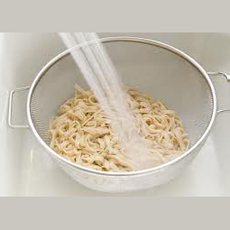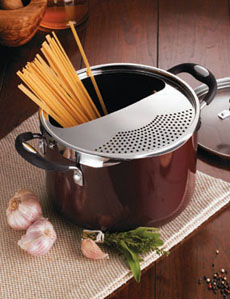TIP OF THE DAY: Pasta Tips For National Pasta Day
|
There are a couple of myths surrounding the proper cooking of pasta, passed down from generation to generation.
Since October is National Pasta Month—and October 17th is National Pasta Day—today’s tip, from Care2.com, dispels those myths. (Here’s the entire article, which covers other cooking myths, as well). Myth: Put Oil In Pasta Water So It Doesn’t Stick Reality: If you remember grade school science class, oil and water don’t mix! When you add oil to pasta water, it floats on the top, away from the pasta. So how can it prevent the pasta from sticking together? The tip was originally suggested by a vegetable oil company, to get people to use more oil. (A similar trick was devised by the shampoo company that originally advised women to lather, rinse, and then do it again! That’s just a waste of shampoo!) |
Enamel stock pot from Tramontina. |
|
|
But worse, the oil that gets onto the pasta when you drain it prevents the sauce from clinging. There’s really only one benefit to adding oil to pasta water, says Care2: It will stop the water from boiling over if the pot is too short. If you use a stock pot to cook your pasta, all you’ll be doing is wasting oil. The real key to keep pasta from sticking: Use the largest pot, with lots of water. |
||
 Don’t do this, unless you’re making pasta salad. Photo courtesy AlexTCooks.com. Check out her recipe for gluten-free calamari pasta. |
Myth: Rinse The Pasta After You Drain It
Reality: If you want the pasta to stick to the sauce—that’s the way it should be, people—don’t rinse it after you drain it. Rinsing removes all of the starch, which helps the sauce cling.* Pasta pros also add a tablespoon of the pasta water to the sauce. The starch that has leached from the pasta into the water helps it cling to the pasta. Tip: For the best pasta-sauce marriage, finish cooking the pasta and sauce together in a skillet. This gives the pasta the most opportunity to absorb the sauce. |
|
|
ONE LAST TIP Be sure to add salt to the water. Some people never learned to do this, or omit it due to a desire to cut back on salt. But unless you’re on a serious salt-free diet, salt gives the pasta (and rice, and potatoes) necessary flavor. Without salted water, the pasta is bland. Add 1 to 2 tablespoons of salt to the rapidly boiling water. HOW TO COOK THE PERFECT AL DENTE PASTA MORE PASTA COOKING TIPS |
||


